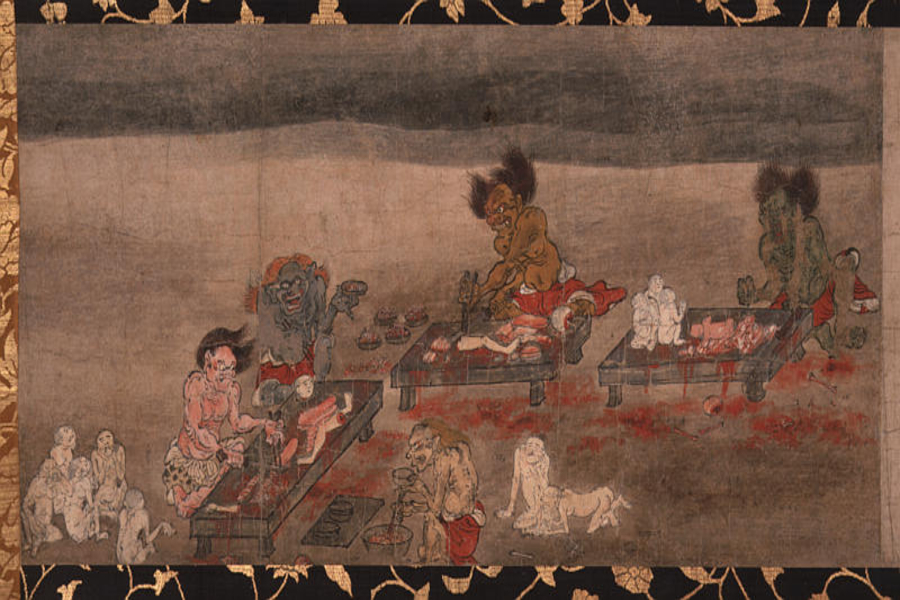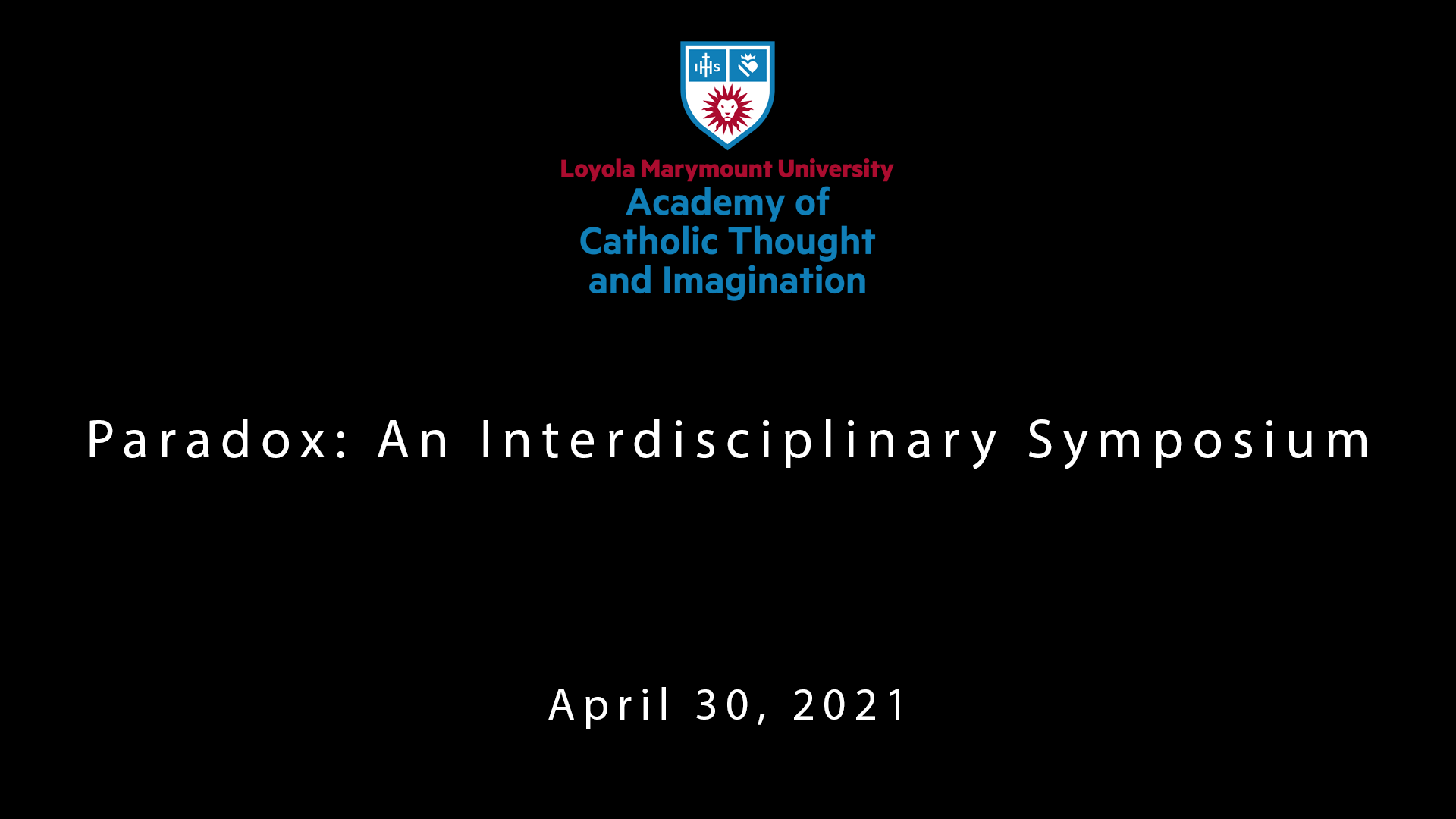Paradox Symposium 2021
Paradox: An Interdisciplinary Symposium

Friday, April 30, 2021
10:00 A.M. to 3:30 P.M. (PST)
This event is recorded and is available for viewing. Please click the play button below to watch the symposium.
This symposium will engage a range of topics with a shared concern for paradox and with faculty and student participation from LMU's departments of Computer Science, English, Philosophy, and Theological Studies.
Asuka Sango (Associate Professor, Carleton College) will offer a keynote address on the issue of paradox as seen in Buddhist debate practices in medieval Japan.
We encourage you to look at the event schedule and the speaker bios below.
This event is sponsored by the Academy of Catholic Thought and Imagination (ACTI) and Theological Studies.
Photo: "Hell of Dissection" (13th century, Japan)
Image courtesy of the MIHO MUSEUM
Event Schedule
(The PDF version of the Paradox Symposium Schedule is available here.)
Welcome (10:00 a.m. - 10:10 a.m.)
[Anna Harrison]
Session 1: The Paradox of Nothing, Structures, and Disciplines (10:10 a.m. - 11:20 a.m.)
[Moderator: Eric Haruki Swanson]
- Paul Harris (ENG) “Nothing but Paradox, Paradoxes about Nothing”
- Diarmuid Breathnach (THST) “Eisai and the Zen Paradox”
- Ray Toal (CMSI) “The Paradox that Led to the Founding of Computer Science as a Discipline”
Break (11:20 a.m. - 11:25 a.m.)
Session 2: Paradox, God, and the Taming of Evil (11:25 a.m. - 12:35 p.m.)
[Moderator: Anna Harrison]
- David Kovacs (PHIL) “Liars Lying and the Underlying Truths of the Eucharist”
- Eric Haruki Swanson (THST) “The Buddhist Lord of Desire and the Paradox of Enlightenment in Medieval Japan”
- Gil Klein (THST) “The Paradox of Domesticating Demons in Rabbinic Literature and Jewish Incantation Bowls”
Lunch Break (12:35 p.m. - 1:05 p.m.)
Session 3: Paradox, Desire, and Wonder (1:05 p.m. - 2:15 p.m.)
[Moderator: Eric Haruki Swanson]
- Frank Stephen Kuwornu (THST) “Is Earthly Desire Paradoxical?: Bernard of Clairvaux’s On Loving God, Part I”
- Anna Harrison (THST) “The Paradox of Celestial Desire: Bernard of Clairvaux’s On Loving God, Part II”
- Sarah Maclay (ENG) “Presence through Absence: A Poetry of Paradox”
Break (2:15 p.m. - 2:20 p.m.)
Keynote (2:20 p.m. - 3:00 p.m.)
[Moderator: Anna Harrison]
Asuka Sango (Carleton College) “Buddhist Debate in Medieval Japan: Its Epistemic Paradox and Soteriological Possibility”
Roundtable Discussion (3:00 p.m. - 3:25 p.m.)
[Moderator: José Garcia Moreno, Director, Academy of Catholic Thought and Imagination]
Concluding Remarks (3:25 p.m. - 3:30 p.m.)
[Eric Haruki Swanson]
*20 min presentations per speaker, 10 min Q&A following each session
Speakers
Session 1
Paul A. Harris, Professor of English at Loyola Marymount University, is co-editor of the literary theory journal SubStance, and served as President of the International Society for the Study of Time 2004 – 2013. He maintains a rock garden and blog, which informs his research, artwork and writings about stone. His project The Petriverse of Pierre Jardin, culminating 10 years of this work, is an open-access work of digital theory in the series SubStance@Work. In 2016 he launched a SLOW LMU initiative, and designed “slow time zones” on campus (The Garden of Slow Time and The Displacement Garden). He has exhibited stone installations at the National Gallery of Denmark, Chapman University, and the Arizona State Art Museum Project Space. He has created recent work in collaboration with jazz musician David Ornette Cherry, author David Mitchell, and artist Richard Turner, and is co-author (with Turner and Thomas Elias) of Contemporary Viewing Stone Display (VSANA, 2020).
Diarmuid Breathnach completed his doctorate in Asian Languages and Cultures at UCLA. Diarmuid has published papers on the origins of Zen Buddhism, Japanese and Chinese philosophy, and the relationship of phenomenology and architecture. Diarmuid's current research projects include a comparative study analyzing pre-Christian Irish Druidic myths and East Asian religious mythologies.
Ray Toal is Professor of Computer Science at Loyola Marymount University in Los Angeles where he has been teaching since 1986 and is currently serving as chair of the department. He received his Ph.D. from UCLA in 1993 in semantics, with minors in theoretical computer science and database systems. His current research interests are in programming language design, compilers, APIs, and large-scale infrastructure. He has consulted for a number of companies in the Los Angeles area, including Citysearch/CityGrid, Medaxis, Friendbuy, Handmade Mobile, M-GO, Criteo, and Special X. Ray has authored three books on programming languages and has been involved with projects at the Human Advancement Research Community (HARC).
Session 2
David Kovacs is a Postdoctoral Instructor of Philosophy at Loyola Marymount University. After working in parts delivery and industrial boiler repairs in the Cleveland area from 2007-2010, he earned his M.A. in the History of Philosophy from Gonzaga University, and in 2018 he earned his PhD in the Philosophy of Religion from Fordham University. At the moment, his research interests might be described as the intersection of analytic theology, apophatic philosophy, and mysticism. He also enjoys studying chess and watching TV shows. His dream is to someday write theology for Netflix.
Eric Haruki Swanson is a cultural historian who studies religious traditions of East Asia through the examination of literature, visual material, ritual practices, and performance arts, and considers the role of religious institutions and its actors within broader cultural patterns, political agendas, and expressions of identity. He is particularly interested in the interactions between Buddhist institutions and the ruling class during times of political crisis and social unrest in pre-modern Japan. His current book project is a study of scholar-monk Jien (1155-1225) and his establishment of exoteric-esoteric Buddhist ritual programs for the pacification of vengeful spirits and the restoration of order in the medieval capital of Japan.
Gil P. Klein is an Associate Professor in the Department of Theological Studies at Loyola Marymount University. He has earned his PhD in History and Philosophy of Architecture from the University of Cambridge, writing about urbanism and ritual in rabbinic Judaism. His doctoral work was further developed during his post-doctoral research in the Frankel Institute for Advanced Judaic Studies at the University of Michigan, Ann Arbor, as well as during his Starr Fellowship in the Center for Jewish Studies at Harvard University. Gil P. Klein has published multiple articles and book chapters on place, space, and material culture in rabbinic literature, emphasizing the links between the text and the archaeological evidence from Roman and Byzantine Palestine. He is currently completing a book about conflict and architecture in the late antique city.
Session 3
Frank Stephen Kuwornu is a Catholic priest from Ghana, ordained in 2013. He is currently pursuing his Masters in Theology at LMU and will be entering the STD program at the Jesuit School of Theology in Santa Clara in the fall. Frank works as a student priest at the St. Francis de Sales Church in Sherman Oaks, C.A.
Anna Harrison teaches classes in the history of Christianity in the Department of Theological Studies. She is at work on Paradox: Bernard of Clairvaux’s On Loving God and Its Influence. “Thousands and Thousands of Lovers”: Sense of Community Among the Nuns of Helfta, on the largest collection of women’s writings in thirteenth-century Europe, is forthcoming from Cistercian Publications.
Sarah Maclay is the author of four poetry collections and three chapbooks—most recently, The “She” Series: A Venice Correspondence, a braided collaboration with Holaday Mason (What Books Press) and Music for the Black Room (UT Press). Her poems and essays have appeared in The American Poetry Review, FIELD, Ploughshares, Blackbird, Hotel Amerika, The Best American Erotic Poetry, Poetry Daily, The Writer’s Chronicle, Poetry International, where she served as Book Review Editor for a decade, and beyond. The recipient of a COLA Master Artist Fellowship, a Pushcart special mention, the Tampa Review Prize for Poetry, and a Yaddo residency, her creative writing and literature courses at LMU include special studies offerings such as The Poetry of Night, EcoPoetry, The Art of Erasure, and Writing from Art: Ekphrastic Poetry.
Keynote Speaker
Asuka Sango (Princeton University, Ph.D.) is a scholar of Japanese religions, specializing in premodern Buddhism. After completing her first book, The Halo of Golden Light: Imperial Authority and Buddhist Ritual in Heian Japan (University of Hawai‘i Press, 2015), a study of Buddhist statecraft, she has been working on her next book project, Living Thought. She examines scholarly practices of learning such as reading, writing, and oral debate in medieval Japanese Buddhism, and breaks new ground by turning to the “backstage” of intellectual life: study notes, lecture scripts, and debate records, produced not by the intellectual giants, but by ordinary scholar monks whose voices have been largely ignored by modern scholars.
